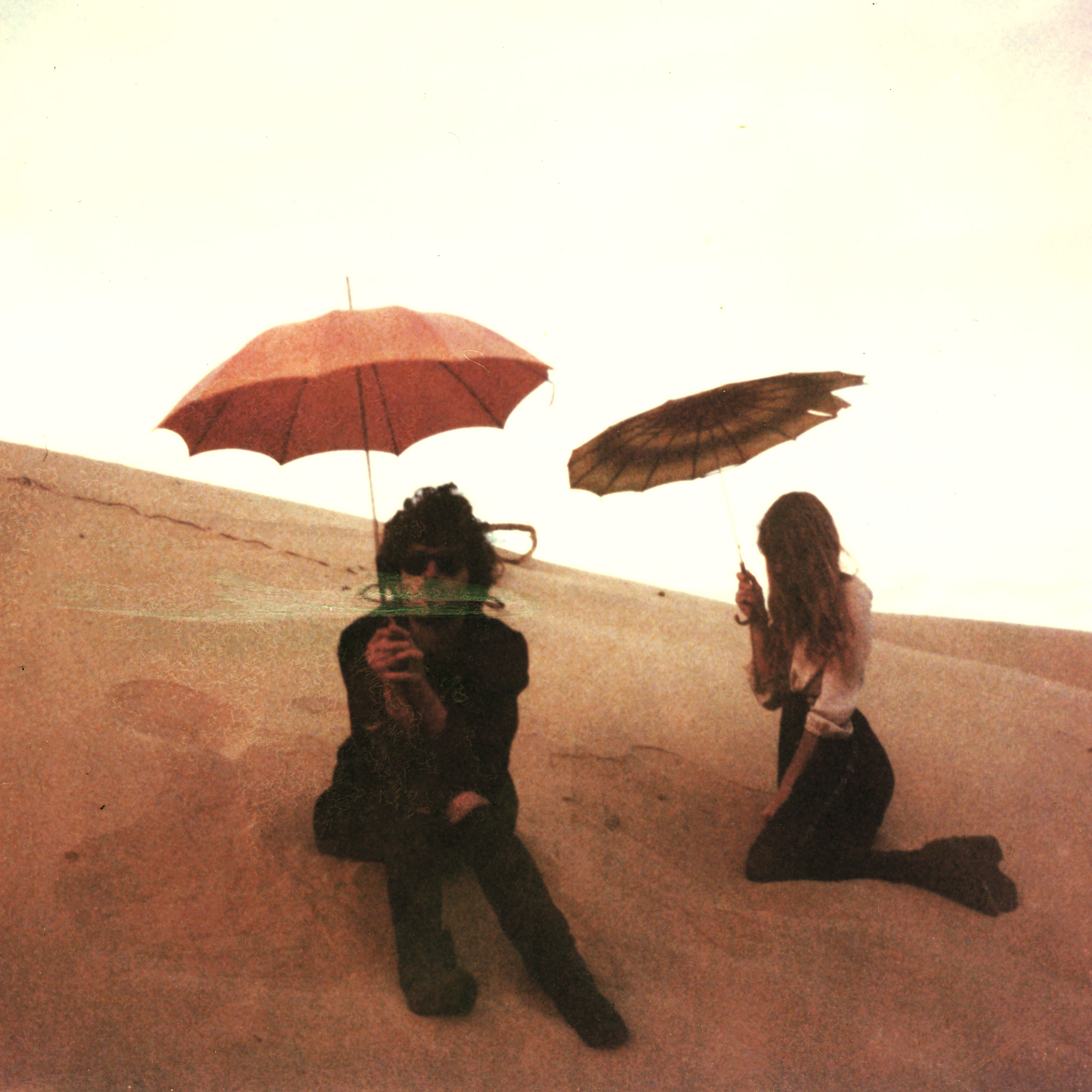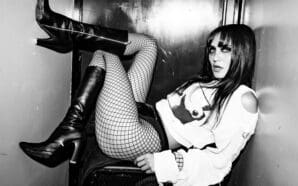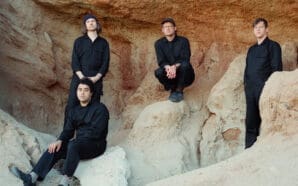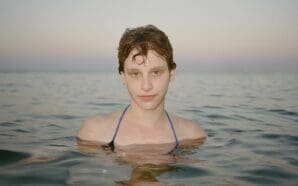HEAR EYE GO is a 25-minute-long sun-drenched, psychedelic foot-stomper that documents the past five years in the lives of Tommy Eisner and Linda Beecroft, better known as Golden Animals… a pretty monumental order. The album is the band’s sophomore effort, following up their 2008 debut, Free Your Mind And Win a Pony, and it drops September 24th on vinyl, CD, digital download, and cassette. The band also have an upcoming local stop Saturday, October 12th, at Ortleib’s Lounge. I recently got a chance to chat with vocalist/guitarist Tommy Eisner, who told me everything you could possibly want to know about what he and Linda have been up to for the past five years.
Izzy Cihak: You’re about to release HEAR EYE GO, your sophomore effort, after about half a decade. How does the album compare to your debut, both in terms of sound and the process of writing and recording?
Tommy Eisner: We approached making HEAR EYE GO very differently from how we made Free Your Mind And Win A Pony, but I think they are very coherent together… We learned a ton about recording and had many big experiences in the years between these records and all of that knowledge and experience was applied to HEAR EYE GO. On FYM, we went into the studio for 11 days and came out with a record. It was our first record, so we made something pretty raw and didn’t consider the sonic elements, the guitar tones, and effects, panning, and overall sound nearly as much as we did on HEAR EYE GO.
When we finished FYM, we immediately wanted to make another record, but a combination of touring to support FYM, securing a solid budget for our next album, our desire to track a record in the desert slowly, over a couple months (where we were living at the time), searching for and refining our sound, and relocating back to Brooklyn were all events that needed to happen before we could make this album.
We had these two main experiences inside us going into making HEAR EYE GO – living secluded in the desert together for a few years and then being back in Brooklyn, living separately, both of us having our own lives and new realities… Life had changed a lot for us by coming back to Brooklyn, but we both also have this deep experience of being in the desert together for three years and playing music night and day and being so devoted to it and our ideas… This album represents both of these realities at once for us. HEAR EYE GO has the psychedelic, meditative quality of the desert and the hard-driving density of the Brooklyn. We consciously put both realities into the album.
[youtube http://youtu.be/-jZmAxJ6F0k]
IC: What are the biggest differences, both practical and conceptual, between Golden Animals while recording your debut and the follow-up?
TE: We wrote Free Your Mind in the Southern California desert, on an abandoned tilapia farm by the infamous Salton Sea – about three hours Southeast of Los Angeles. We had moved as a band out to the West Coast from Brooklyn only a few days before finding and answering a Craigslist ad for house-sitters on a remote ranch. That experience was sort of the foundation of our identity as a band. FYM was an exploration of freedom from society and immersion in nature and our own selves. Linda had been living in London and Paris for many years and I had only lived in Brooklyn and Baltimore (where I was born and raised)… So, to suddenly and unexpectedly be on a 20-acre ranch in the middle of nowhere in the desert with only our van and instruments was a huge change that revealed many things about living in big cities that can’t be seen or felt from living within them… Your consciousness has a way of expanding when you have privacy in nature and a lot of pressures you associated with and believed were real you come to realize aren’t as real as you once thought. Reality is something we create. Living in any city is no more or less real than the experience of living alone in the desert… In some ways the desert has qualities that make things feel more real and more like a dream at the same time… These were the things we were thinking about while making FYM and I think still carry with us today.
After making and releasing FYM in 2008, we attempted to self-record an album in the desert in a 1950’s doublewide trailer we were offered to stay in for free in 2010… This album was never mixed, mastered, or released, because we felt the rawness of our recording equipment and technique didn’t result in something we thought we should release at that point. Although, we have plans to finish and release it soon…
All the touring for FYM and recording the unreleased desert session record was what we learned the most from and applied to making HEAR EYE GO. Even though it was difficult to work so hard on an album we wound up not releasing, we learned how to record ourselves, how to use the studio as an instrument, and why a professional engineer and studio are so necessary for us… We were both comparatively naïve about recording when we made FYM… But coming into HEAR EYE GO, we had a sound in our heads, a lot of new sonic ideas, and a general approach to recording, which we’d learned from our experiences before. We knew we needed a great engineer and studio where we felt comfortable (that wound up being Matt Boynton at VIR) and that we wanted to record a lot of the arrangements and overdubs at our own pace in our practice space in Brooklyn.
HEAR EYE GO is a hi-fidelity hybrid of a studio record and a home recording. Because of this approach, we feel we were able to make a record that’s more realized in every way than what we’ve released before.
IC: I’ve been saying this to a lot to bands recently (which I love) but, I fucking love that the album is going to be available on cassette, which is my favorite way to experience music for about a billion reasons. So, I have to ask, what is your take on contemporary consumption of music? How do you most like to experience/consume music?
TE: Yeah, Burger Records are like the new kings of the cassette tape. We’ve never had a cassette of our music printed before. It’s a good sign to see these getting made now. Vinyl will always be my favorite document of music for many reasons… I think ever since vinyl the industry has been continuously looking for new ways to make music as transportable as possible… Which they have now finally achieved by making recorded music an invisible, physical energy you can instantly download from the air around you to something you already carry in your pocket… But no one’s ever improved on the vinyl, in terms of sound and its art-presence. Vinyl is just so heavy and delicate, compared to a digital file, it limits where and when you can listen to music… And people want to listen to music all the time, everywhere: the car, the shower, at work, the subway, the street, at school, in bed…
The only real problem I have now with how digital has affected music listening, is a lot of people (myself included) go to YouTube to ’listen’ to music, where you have this video player in front of you and now the expectation is to watch music, not only listen… So bands are supposed to be music video makers as well as bands, which is fine, I guess, but it can be a distraction from the music for both the artist and the listener… And pretty much all my favorite records don’t have videos and don’t need any videos… I think right now it’s possible for a weak song/recording to have a strong video and for it to do very well… And then, on the other side, a band could release a strong song/recording with a weak video that somehow hurts the power of the recording or lessons the mystique of the band… I don’t know what to make of that. Music is and always will be a sonic expression you don’t need eyes to understand and fully feel and understand.
IC: What do you currently consider to be your biggest influences and inspirations?
TE: Songs and great songwriters are the biggest influence on us. Songs are at the center of what we do. I also got heavy into 60’s and 70’s westerns over the last year… For a while I was watching two a night, just staying up all night watching and re-watching westerns. I’m not sure what is so appealing about them, but I probably watched westerns this year as much or more than I listened to music. There’s usually very good music in westerns, actually.
IC: Are there any contemporary acts that you find to be especially interesting or inspiring, whether they’re doing anything similar to yourselves or not?
TE: Yes, there are some… But most of what we listen to and are inspired by are bands and artists that are no longer performing or alive… It’s not cause they’re older that we like them. It’s ‘cause their recordings and songs are so good. I’ve always wanted to make work at that level in this time. We’re both drawn to timelessness, universals, and spiritual elements in music and art. In certain previous eras, these elements were popular and successful, so artists were able to make incredible recordings that are timeless and universal in a way I’m not sure is as possible right now, but that may change or be changing already. There’s less money in the business ‘cause of free downloading and the radio has become a corporate tool, rather than a way of people communicating, so music that empowers, is timeless and universal is up against new challenges now to get made in a way that will be as realized as the great albums.
I think a lot of the music played on the radio today is unbelievably dark, sometimes to the point of being poisonous and oppressive… It’s such a powerful medium, it may be the most powerful medium there is (in art), so if you hear a sentiment or a feeling is projected into you over the radio every day, it’s going to have an effect on you. That’s why having the radio be something positive is so important and such a big thing to have lost to corporate money. I don’t think music on the radio gets played because people necessarily like the music that’s played, I think they’ve learned to accept it and forgot what music can and should be. And the music they’re hearing over and over is getting played for non-musical reasons by forces that are not related to music or musicians. People may think The Beatles made great albums only because they were so incredible, which is true, but they also had an unlimited budget and access to the best of everything to make their albums ‘cause there was so much more money in the industry then and the radio was far less controlled by one power.
It’s a hard line to walk today, ‘cause you need money to make quality records, but you can’t get money through any channels that will compromise or destroy your art.
If you made a good record before and people heard about it and liked it, they’d buy it… but you can’t count on that today. Just because people like your music and listen to it doesn’t mean they bought it.
[youtube http://youtu.be/_ZUy8IWPINo]
IC: You’re currently on tour in Europe and have an upcoming stop in Philadelphia. How would you characterize your live show? What should be expected?
TE: People at the European shows keep using the words “haunted” and “from another dimension”… We are coming from the lands of Ingmar Bergman (Linda’s from Sweden) and Edgar Allen Poe and Billie Holiday (I’m from Baltimore)… And the desert is like a haunted other dimension itself… Perhaps our live show is like a combination of haunted psych garage and ghost channeling. We have developed a very dense, big sound for a duo and people are generally pretty stunned (or do not believe we’re telling the truth) to find out it’s just two people filling the venue with sound with just a guitar and drums and no backing track.
IC: What’s next for Golden Animals? Is it going to be another five years before your next full-length?
TE: We hope not and I really doubt it. We have a new record written and are performing a lot of post-HEAR EYE GO songs on this tour. We also would like to finish and release the desert session recordings in the not too distant future. I guess we’ll all have to see what comes… Now that we have our studio process down and our second LP behind us, I hope we’ll begin releasing a lot of music very quickly now.
